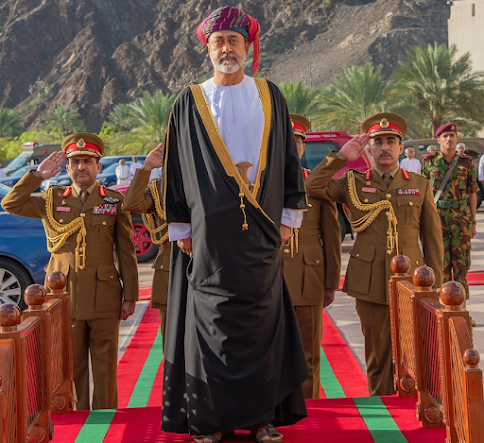Egyptian officials told an Emirati newspaper today, Wednesday, that Egypt and Iran are expected to exchange ambassadors within months, as part of a process brokered by the Sultanate of Oman to normalize relations between the two regional powers.
Two officials told the English-language The National that a meeting had been agreed in principle between Egyptian President Abdel Fattah al-Sisi and his Iranian counterpart, Ibrahim Raisi.
They said the meeting was likely to take place by the end of the year.
The news comes days after Oman's Sultan Haitham bin Tariq paid a two-day visit to Egypt, where he discussed with Sisi including Cairo's relations with Tehran, according to the officials.
For its part, Iran has said it wants better relations with Egypt, the most populous Arab country. However, the Egyptian government has been silent on relations with Iran, but regional media have been reporting on an imminent improvement in relations in recent weeks.
The two officials said normalizing relations with Iran guarantees Tehran's goodwill with regard to Cairo's efforts to forge closer economic and trade ties with countries such as Iraq, Syria and Lebanon, where it wields significant influence.
According to the newspaper, mid-level diplomats and intelligence officials from Iran and Egypt have held closed-door consultations on normalizing relations since last March. The latest round of these talks was held earlier this month in Baghdad, whose government has close ties with Tehran.
And she continued: “In addition to bilateral relations, the talks touched on reducing tension in places where Iran exercises great influence, such as Yemen, Lebanon and Syria, by supporting allied Shiite governments or armed groups.”
She believed that "the thaw in relations between Cairo and Tehran would add a new layer to the ongoing regional realignment that is changing the political landscape in the region."
Saudi Arabia, for example, has agreed to restore diplomatic relations with Iran that were severed in 2016, thus removing a major source of tension in the Middle East. Egypt and Turkey are also working to resolve a decade-long dispute, and in the actual direction of normalizing relations.
The eight-year war in Yemen, where Iran supported Ansar Allah against the internationally recognized government, which is backed by a Saudi-led military coalition, has subsided dramatically amid diplomatic moves to end the conflict.
Syria returned to the League of Arab States this month, amidst a great Iranian welcome. President Bashar al-Assad attended the Arab Summit in Jeddah last week for the first time in 12 years.
Tehran's relations with Cairo have been fraught since the overthrow of Iran's Mohammad Reza Pahlavi in the Islamic Revolution of 1979.
Pahlavi died in Egypt in 1980 and was buried with other members of his family, causing tension between Cairo and Tehran.
Relations deteriorated further when the Iranian government named a street in Tehran after Khaled Islambouli, the Egyptian army officer who led a team of assassins who assassinated former Egyptian President Anwar Sadat during a 1981 military parade in Cairo.
Relations also increased tension over what Cairo considers Iranian interference in the internal affairs of Arab countries such as Iraq, Syria, Lebanon and Yemen.
Unlike Saudi Arabia, which closed its embassy in Tehran in 2016, Egypt has maintained diplomatic representation in Iran since the Islamic Revolution. However, it has only the chargé d'affaires who manages its mission in Tehran. Iran on the other hand has a functioning embassy in Cairo.
Related to this development, the Omani news agency announced today, Wednesday, that the Sultan of Oman, Haitham bin Tariq, will visit Iran, next Sunday, on a two-day official visit, accompanied by a high-ranking official delegation.
The agency stated, in a statement, that the visit comes within the framework of strengthening the friendship ties between the Sultanate of Oman and the Islamic Republic of Iran, consolidating fruitful relations and good neighborliness between them, and in response to the invitation extended to him by the Iranian President, Ibrahim Raisi, to Sultan Haitham bin Tariq.
The statement added that the visit contributes to consultation and coordination between the two leaderships to discuss various developments on the regional and international arenas.
At the beginning of this month, the Chief of the General Staff of the Iranian Armed Forces, Major General Muhammad Bagheri, met the Sultan of Oman, and held a round of talks with him.
Iranian media reported that the Sultan of Oman told Bagheri, "The level of cooperation in various defense and military fields between the two countries' armed forces must be raised."
It is noteworthy that Tehran and Muscat have close relations, and they signed 8 memorandums of understanding and 4 cooperation programs last May, during Raisi's official visit to Oman.
During that visit, 12 cooperation documents were signed in the fields of energy, politics, transport, diplomatic cooperation, trade and economic relations, science, the environment and sports. A joint statement was issued by both sides at the end of the visit.
After his return to Tehran, Raisi confirmed that the positions of Iran and the Sultanate of Oman are "remarkably consistent on many issues," noting that "the good relations between Iran and Oman enhance regional cooperation."


































No comments:
Write comments